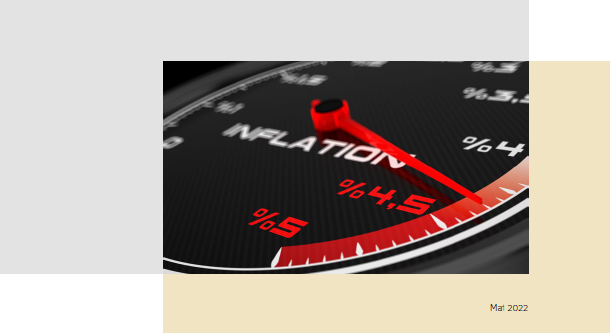After decades of being a rather marginal topic, inflation is now back at the top of the agendas of policy makers and the investment community. This has led SFI to analyze the current inflationary environment in a comprehensive Public Discussion Note (PDN) entitled "Rising Inflation—A Roadmap for Investors".

Until recently, financial markets were facing historically low bond yields and high equity valuations, and operating in an environment that was responding to expansions in central bank balance sheets. Contrary to its reputation as a financial “safe haven”, it is now apparent that global inflation dynamics do not stop at the Swiss border. In February 2022, 12-month inflation reached 2.2%, one of the highest levels in the country since the mid-1990s with the exception of a short-lived inflationary episode in 2008. The Swiss National Bank now forecasts even higher inflation levels. At its March 2022 meeting, it raised its inflation forecast for 2022—compared to that of December 2021—by one percentage point to 2.1%.
The Swiss investment community is reacting to the new regime. A recent survey shows that a slight majority of market participants have already taken steps to align their portfolios with a rising inflation environment and a normalization of monetary policies. "International investors are tilting their equity exposure toward value and financial stocks, and further purchasing floating rates notes and TIPS (Treasury Inflation Protected Securities)", notes Prof. Francesco Franzoni, SFI Senior Chair and Professor of Finance at Università della Svizzera italiana, and coauthor of the PDN. In contrast, the room for maneuver for investors focusing on the Swiss market is rather limited. Domestic options are scarce as the entire Swiss franc yield curve was in negative territory until the end of 2021 and since the beginning of 2022 has risen above zero only for government bonds with a maturity of three years or more. Dr. Francesco Mandalà, Chief Investment Officer at MBaer Merchant Bank AG and coauthor of the PDN, adds, "Despite this shift, Swiss franc–denominated bonds are likely to generate a negative return this year due to the rise in interest rates".
Is Cash the Least Worst Choice?
Cash holdings in Swiss francs will suffer from negative interest rates on current accounts and from the current level of inflation. The situation is likely to worsen further with a possible increase in inflation during the second half of the year. This overall situation is a consequence of unconventional monetary policies pursued by central banks worldwide. The two coauthors reason that the optimal portfolio for conservative investors with a short-term investment horizon should consist mainly of cash; however, negative interest rates have already pushed these investors into riskier asset classes. Similarly, Prof. Franzoni and Dr. Mandalà advise reducing tactical holdings of long-dated bonds, including government bonds and other fixed-income asset classes with long maturities. Unfortunately, TIPS have shown poor inflation protection for local investors as they are linked to US inflation, which develops differently than Swiss inflation.
Focus on Equities for the Long Term
Swiss investors with a long-term investment horizon should focus on equities using a factor investing approach. Indeed, value, momentum, carry, and low-volatility investment styles exhibit relatively stable patterns of risk-adjusted returns across macroeconomic situations, suggesting that they are less sensitive to economic cycles. Against this backdrop, the two coauthors anticipate that value and low volatility stocks will outperform the market in the current inflationary environment.
The detailed SFI Public Discussion Note "Rising Inflation—A Roadmap for Investors" by Prof. Francesco Franzoni, SFI Senior Chair and Professor of Finance at Università della Svizzera italiana, and Dr. Francesco Mandalà, Chief Investment Officer at MBaer Merchant Bank AG, can be found here.

